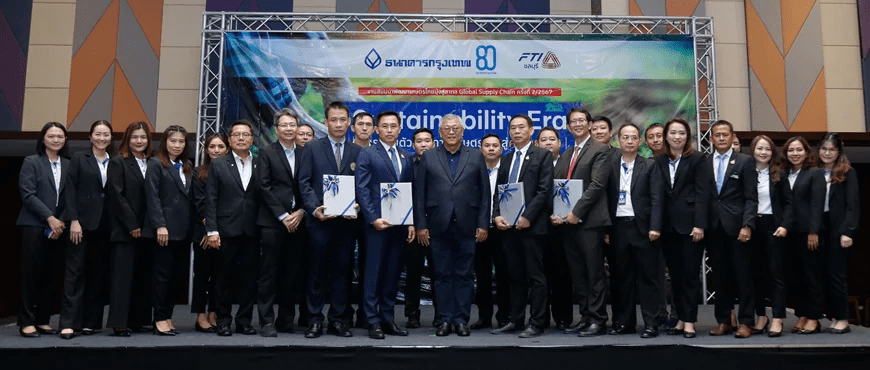
Bangkok Bank is advising exporters of seven types of agricultural products to EU countries to accelerate the transition of their businesses to decarbonise and avoid deforestation before the new regulations come into force later this year. To reinforce its role as a “trusted partner” supporting knowledge and low-interest lending, the Bank invited experts to provide insight into the impact of the regulations and help clients identify opportunities in global markets that will enable them to grow their businesses sustainably.
Than Siripokee, Bangkok Bank’s Executive Vice President and Head of Corporate Banking, said Bangkok Bank, as a “trusted partner”, has continuously provided its customers and Thai business owners with knowledge and awareness of changing global markets so they can adapt accordingly.
The second seminar of the year, titled “Sustainable Era: Thailand’s agricultural sector’s transition to sustainability,” aims to develop Thai farmers to be part of global supply chains and urged businesses to transform themselves to achieve sustainable growth while maintaining environmental responsibility. Businesses, especially exporters, will have to comply with new EU laws and regulations aimed at reducing carbon emissions and creating sustainable and efficient use of resources, such as the Carbon Border Adjustment Mechanism (CBAM) and the EU Deforestation Regulation (EUDR). From 30 December 2024, these laws will affect seven groups of commodities: wood, rubber, palm oil, cocoa, coffee, soybeans and livestock.
The effects of climate change are becoming more severe and many countries are introducing more regulations.
In the face of this trend, exporters must keep a close eye on the positive and negative effects. If companies can make adjustments quickly, business opportunities can be created. However, if companies are not prepared, they may limit their business activity. Bangkok Bank therefore encourages exporters to keep abreast of the latest developments and the changing business environment. In the meantime, the Bank is ready to provide special interest loans, such as the Bualuang Green Loan, the Bualuang Green Loan for Solar Energy and the Bualuang Transformation Loan, to provide business operators with sufficient capital to prepare their businesses to meet the challenges posed by global trends in a sound and sustainable manner.
KBank empowers Thailand and its companies to win in the global ‘Climate Game’
“Over the past 80 years, Bangkok Bank, as a ‘trusted partner’, has not only supported entrepreneurs with loans to transform traditional businesses into digital and environmentally friendly enterprises, but has also served as a knowledge hub for entrepreneurs by updating them on changing trends and global regulations.
“Companies can no longer stay as they are and must adapt to the changing environment. If companies can overcome the requirements, they will be protected against all odds, while the value of their products will be greater and market expansion more feasible. The Bank organizes study tours to showcase companies that have successfully transformed their operations with the aim of inspiring other companies to prepare for new challenges in a robust and sustainable way,” said Mr. Than.
Deputy Director of the Applied Economics Research Centre at the Faculty of Economics at Kasetsart University, Associate Professor Witsanu Attavanich, Ph.D., said: “Changes in global climate conditions will intensify El Niño and La Niña events, causing Thailand to experience increasingly hot and dry weather. In addition, rainy seasons will become more irregular, significantly affecting the agricultural sector. The impacts of climate change are projected to cause significant economic damage to Thailand by 2100, resulting in a reduction in per capita income of more than 50% annually. This forecast does not include risks associated with transitions after countries begin implementing measures to mitigate environmental impacts, such as CBAM and EUDR, which will be key constraints preventing Thailand from exporting goods to the European market.”
“According to a study, Thailand’s agricultural sector remains fragile as it faces an ageing society at a faster rate than the national average, while young people are also leaving the sector at an accelerated rate. In addition, people working in agriculture have lower levels of education than those in non-agricultural sectors. We also found that 80% of people engaged in agriculture own less than 20 rai of land, and only 26% have access to irrigation systems. Furthermore, climate change will cause greater damage to rain-fed agriculture than to irrigated agriculture. The cumulative damage from 2011 to 2045 is estimated to be valued at approximately 0.609 trillion to 2.85 trillion baht, leading to the widening of the inequality gap.”
Companies, especially exporters, will have to comply with new EU laws and regulations aimed at reducing carbon emissions and creating sustainable and efficient use of resources.
“Farmers still have little understanding that any transition to reduce environmental impact will come at a significant cost to Thai businesses. Therefore, the Government and the business sector must play a role in educating these farmers and incentivising them to really develop, rather than simply providing them with free funds without conditions. If they do not adapt, they will be exposed to the risks of climate change in the future,” said Professor Wissanu.
Chalerm Kokanutaporn, Vice President of FTI’s Chonburi Branch and CEO of Thai Eastern Group Holdings Public Company Limited, said the agricultural sector must adapt quickly and increase its production per rai to meet market standards. Meanwhile, the public sector must support or create an enabling environment for doing business and ensure that information is up-to-date and accessible to all. In addition, the criteria or definition of SME entrepreneurs should be revised so that they can receive government benefits and support to expand their businesses. Large companies can also support Thai small entrepreneurs by providing them with knowledge. For example, Bangkok Bank regularly holds seminars and invites experts to provide updated market information and share experiences, thereby helping small entrepreneurs understand and adapt.
“Financial institutions are crucial to the growth of the business sector. To ensure sustainable business growth, the Government should accelerate the implementation of a taxonomy that provides clear criteria for financial institutions to assess loans and offer special interest rates to entrepreneurs. This will incentivise entrepreneurs to move towards a green economy, thereby driving the Thai economy and society towards sustainability and keeping pace with global changes,” said Chalerm.
«To achieve business success and sustainable growth, it is crucial to seek out new opportunities, continually learn about the business environment and have a clear business plan to create adaptable strategies and always see every change or challenge as an opportunity. Today, the size of a company, whether large or small, does not matter, as “the fast will beat the slow.”
For example, as a fast-growing company, we took the opportunity of the depreciation of the Thai baht during the Tom Yum Kung economic crisis in 1997 to develop new products and expand our overseas market. At the same time, we committed ourselves to developing business standards to foster investor confidence, generate growth and go public. By driving the organization along the lines of sustainable development, Thai Eastern Group has become one of the leading producers and distributors of natural rubber and crude palm oil in the eastern region, and we are also a producer of renewable energy in the form of integrated bioenergy in the Eastern Economic Corridor area.”
Source: https://reporteasia.com/economia/desarrollo-sostenible/2024/08/02/banco-bangkok-recomienda-exportadores-productos-agricolas-descarbonicen-pongan-fin-deforestacion/

